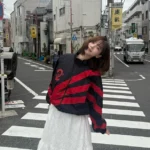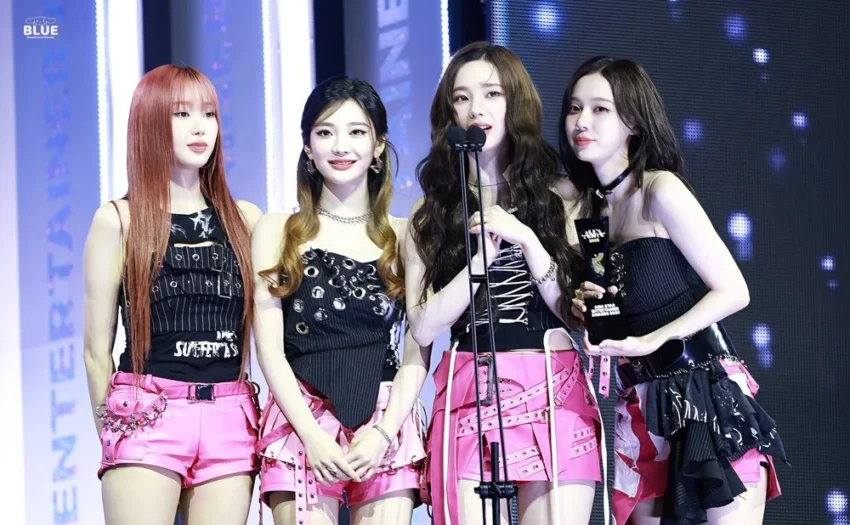Karina Political Controversy began when she posted a photo wearing a red and black jacket with the number two, which many interpreted as a sign of support for South Korea’s conservative party. The image spread rapidly online, leading to speculation, criticism, and public backlash despite her clear denial of any political message. Both detractors and supporters continued to use her image for political arguments, deepening the controversy.
Karina Political Controversy Begins from a Simple Photo Post
On May 27, Karina shared a photo on her social media, showing herself walking through a street in Japan. She added only a rose emoji to the post, with no caption to suggest any specific message. In the picture, she wore a red and black jacket that had the number two printed in red. This seemingly innocent detail quickly drew unexpected attention online. People began to associate the red color with South Korea’s conservative People Power Party and the number two with its electoral symbol. Based on these visual elements alone, many speculated that Karina was showing political support for the party. As the post spread through online communities under titles like “Karina’s Recent Update,” the debate intensified. What started as a casual fashion choice soon turned into a nationwide political controversy, placing Karina at the center of a storm she never intended to start.
Karina Political Controversy Grows Despite Her Quick Response
As the political assumptions grew louder, Karina deleted the post to calm the situation. She then explained on the Bubble app that the outfit had no political message. Her comment emphasized that there was no deeper meaning behind the clothing or the emoji. However, her clarification did little to slow the rumors. On the contrary, some critics claimed her deletion confirmed guilt.
The backlash continued across forums and social media, with people dissecting her choices as if she had made a public statement. The situation revealed how easily the internet can twist everyday moments into political symbols. Despite Karina’s efforts to clarify, she remained under attack from those convinced she had crossed a line, even though she had never spoken about politics before.
Fans Push Back Against the Karina Political Controversy
On May 28, Karina’s fans took action by releasing a statement defending her. They strongly criticized the way one female celebrity’s social media post became the target of political anger. The statement argued that society should not tolerate such online hate, especially when directed at women in the entertainment industry. Fans highlighted how the original image had been misinterpreted and blown out of proportion. They emphasized that Karina had never expressed support for any political party and warned against turning entertainers into political tools.
Meanwhile, discussions on the Dcinside Karina Gallery showed growing frustration. Some fans argued that even those claiming to support Karina were actually using her for their own agendas. A few called for her to post a message clearly asking people not to politicize her image. The fans stood firm in saying that she should be able to live and work without being dragged into political fights she never chose.
Media Reaction and Public Figures Add Fuel to the Fire
While fans tried to defend her, parts of the media added to the pressure. A major sports newspaper criticized Karina for smiling at the 2025 ASEA Awards, saying she should be reflecting on her actions. This unusual attack seemed to suggest that she had no right to appear joyful while under public scrutiny. In response, several public figures stepped up to defend her. Popular Korean history lecturer Jeon Hangil publicly declared, “We will protect Karina,” making it clear he believed she was being unfairly targeted. Cartoonist Yoon Seo-in and comedian Kim Young-min also voiced their support, along with some members of the People Power Party.
These voices of support were meant to shield Karina, but they also deepened the perception that she was linked to one side of the political spectrum. This only made the controversy more complex and difficult to escape. What was originally an attempt to defend a celebrity turned into a new wave of political debate.
A Democratic Society Must Respect Personal Freedom
At the core of this entire incident lies a troubling truth: Karina never tried to make a political statement. The situation became even more complicated when the public learned that Lee Dong-ho, the son of presidential candidate Lee Jae-myung, had targeted Karina with sexually abusive comments online. This issue became national news when another presidential candidate, Lee Jun-seok, mentioned it during a televised debate. In that political context, Karina’s jacket seemed to signal support for the opposing party, even though there was no evidence to confirm that. This mistaken connection shows how quickly false narratives can spread when politics and pop culture collide.
Still, South Korea is a democratic country where people have the right to support any party—or none at all—without being attacked. Even if Karina had intentionally chosen that jacket as a political statement, which she didn’t, she would still be within her rights. Instead, she has become a victim in a conflict she never chose. She deserves the freedom to dress, post, and smile without fear of being misunderstood or misused.

Thank you so much for reading this post! I’d love to hear your thoughts, so feel free to share them in the comments!


It doesn’t make sense that idols are persecuted for expressing political views in a 21st-century democracy. Seriously makes you wonder if South Korea is really a democracy. Plus, Karina even clarified that she didn’t make a political statement. South Koreans need to get a grip.